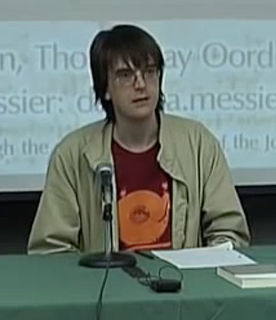Related Research Articles
A person is a being that has certain capacities or attributes such as reason, morality, consciousness or self-consciousness, and being a part of a culturally established form of social relations such as kinship, ownership of property, or legal responsibility. The defining features of personhood and, consequently, what makes a person count as a person, differ widely among cultures and contexts.
Akan is a Central Tano language and the principal native language of the Akan people of Ghana, spoken over much of the southern half of Ghana. About 80% of Ghana's population can speak Akan, and about 44% of Ghanaians are native speakers. It is also spoken in parts of Côte d'Ivoire.
Kwasi Wiredu was a renowned Ghanaian African philosopher. His work contributed to conceptual decolonisation of African thought.

The Akan are a meta-ethnicity living primarily in the countries of present-day Ghana and Ivory Coast in West Africa. The Akan language are a group of dialects within the Central Tano branch of the Potou–Tano subfamily of the Niger–Congo family. Subgroups of the Akan people include: the Agona, Akuapem, Akwamu, Akyem, Ashanti, Bono, Fante, Kwahu, Wassa, and Ahanta. The Akan subgroups all have cultural attributes in common; most notably the tracing of matrilineal descent, inheritance of property, and succession to high political office.
Kwame Gyekye was a Ghanaian philosopher, and an important figure in the development of modern African philosophy. Gyekye was an emeritus Professor of Philosophy at the University of Ghana, and a Visiting Professor of Philosophy and African-American studies at Temple University. He is known for theorizing the concept of person-hood on the basis of Akan cultural paradigm in debate with Kwasi Wiredu, which is seen as one of the defining moments of modern African philosophy.
Bono State was a trading state created by the Bono people, located in what is now southern Ghana. Bonoman was a medieval Akan kingdom in what is now Bono, Bono East and Ahafo region respectively named after the and Eastern Ivory Coast. It is generally accepted as the origin of the subgroups of the Akan people who migrated out of the state at various times to create new Akan states in search of gold. The gold trade, which started to boom in Bonoman as early in the 12th century, was the genesis of Akan power and wealth in the region, beginning in the Middle Ages.

Joseph Kwame Kyeretwie Boakye Danquah was a Ghanaian politician, scholar, lawyer, and one of the founding fathers of Ghana. He played a significant role in pre- and post-colonial Ghana, which was formerly the Gold Coast, and is credited with giving Ghana its name. During his political career, Danquah was one of the primary opposition leaders to Ghanaian president and independence leader Kwame Nkrumah. Danquah was described as the "doyen of Gold Coast politics" by the Watson Commission of Inquiry into the 1948 Accra riots.

Adinkra are symbols from Ghana that represent concepts or aphorisms. Adinkra are used extensively in fabrics, logos and pottery. They are incorporated into walls and other architectural features. Adinkra symbols appear on some traditional Akan goldweights. The symbols are also carved on stools for domestic and ritual use. Tourism has led to new departures in the use of the symbols in items such as T-shirts and jewellery.

Akan art is an art form that originated among the Akan people of West Africa. Akan art is known for vibrant artistic traditions, including textiles, sculpture, Akan goldweights, as well as gold and silver jewelry. The Akan people are known for their strong connection between visual and verbal expressions and a distinctive blending of art and philosophy. Akan culture values gold above all other metals, so the artwork and jewelry made of gold reflects a great deal of value, whether it be made for appearance, artistic expression, or more practical trading purposes.
Bono, also known as Abron, Brong, and Bono Twi, is a Central Tano language common to the Bono people and a major dialect of the Akan dialect continuum, and thus mutually intelligible with the principal Akan dialects of Fante, Asante, and Akuapem, collectively known as Twi. It is spoken by 1.2 million in Ghana, primarily in the Central Ghanaian region of Brong-Ahafo, and by over 300,000 in eastern Ivory Coast.

Africana philosophy, sometimes called African philosophy, covers the philosophy made by African descendants, including African Americans. Africana philosophers are found in the various academic fields of present philosophy, such as metaphysics, epistemology, moral philosophy, and political philosophy. One particular subject that several modern Africana philosophers have written about is that on the subject of freedom and what it means to be free or to experience wholeness. Philosophy in Africa has a rich and varied history, some of which has been lost over time. In the early and mid-twentieth century, anti-colonial movements had a tremendous effect on the development of a distinct modern African political philosophy that had resonance on both the continent and in the African diaspora. One well-known example of the economic philosophical works emerging from this period was the African socialist philosophy of Ujamaa propounded in Tanzania and other parts of Southeast Africa. These African political and economic philosophical developments also had a notable impact on the anti-colonial movements of many non-African peoples around the world.

Dean W. Zimmerman is an American professor of philosophy at Rutgers University specializing in metaphysics and philosophy of religion.

Akan religion comprises the traditional beliefs and religious practices of the Akan people of Ghana and eastern Ivory Coast. Akan religion is referred to as Akom. Although most Akan people have identified as Christians since the early 20th century, Akan religion remains practiced by some and is often syncretized with Christianity. The Akan have many subgroups, so the religion varies greatly by region and subgroup. Similar to other traditional religions of West and Central Africa such as West African Vodun, Yoruba religion, or Odinani, Akan cosmology consists of a senior god who generally does not interact with humans and many gods who assist humans.

Twi, also known as Akan kasa, or Akan-speak, is a dialect of the Akan language spoken in southern and central Ghana by several million people, mainly of the Akan people, the largest of the seventeen major ethnic groups in Ghana. Twi has about 17–18 million speakers in total, including second-language speakers; about 80% of the Ghanaian population speaks Twi as a first or second language. Like other West African languages, Twi is a tonal language.
Personhood or personality is the status of being a person. Defining personhood is a controversial topic in philosophy and law and is closely tied with legal and political concepts of citizenship, equality, and liberty. According to law, only a legal person has rights, protections, privileges, responsibilities, and legal liability.
Ajume Wingo is a Cameroonian political and social philosopher who is an associate professor at the University of Colorado at Boulder. Much of his work has focused on the analysis of non-liberal or corrupt democratic states with particular focus on contemporary African states. He has also published articles on African art, aesthetics, and culture, often juxtaposing these with western practices and customs.

Ifeanyi Anthony Menkiti was a Nigerian poet, philosopher, and professor, as well as the owner of the Grolier Poetry Book Shop in Cambridge, Massachusetts.
Ike Ferdinand Odimegwu is a Nigerian professor of philosophy and political philosopher.
Didier Njirayamanda Kaphagawani or Didier Kaphagawani was a Malawian philosopher. He is known for his ideas on African philosophy. This included ideas on African epistemology and African understandings of personhood.
Motsamai Molofe is a South African philosopher, one of the thinkers to have popularised African philosophy, and specifically Applied Ethics in context of Ubuntu philosophy. Molofe is Professor of Philosophy at the University of Fort Hare in Alice, Eastern Cape.
References
- 1 2 3 Wingo, Ajume. "Akan Philosophy of the Person". Stanford Encyclopedia of Philosophy. Retrieved 7 November 2020.